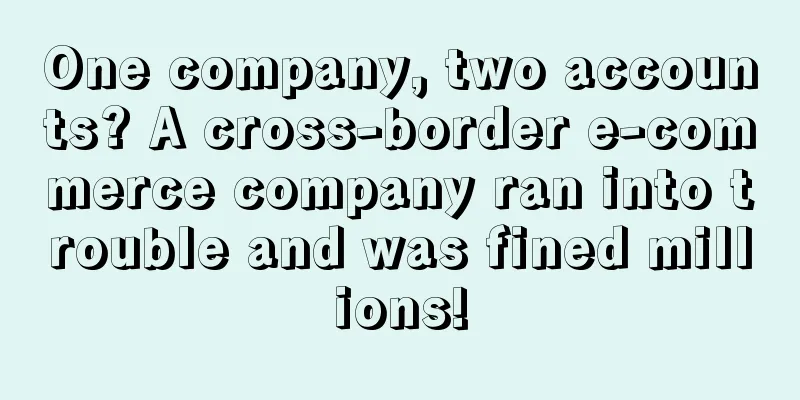One company, two accounts? A cross-border e-commerce company ran into trouble and was fined millions!

|
The fact that Wei Ya was fined 1.341 billion yuan for tax evasion has caused heated discussion. This is not a small amount for both small and medium-sized cross-border sellers and large sellers. This incident also sounded a wake-up call for all cross-border sellers, making them realize once again the importance of operating in compliance with regulations.
A cross-border e-commerce company in Hangzhou was fined 2.1 million yuan for tax evasion
Recently, the First Inspection Bureau of the Hangzhou Taxation Bureau successfully investigated and dealt with a cross-border e-commerce tax evasion case . The company was required to pay a total of 2.1 million yuan in taxes and late payment fees in accordance with the law.
According to reports, the company operates on multiple platforms, selling on multiple e-commerce platforms such as Amazon and AliExpress, with a total of 14 stores. The report shows that the company has set up two sets of accounts, internal and external, and has problems with concealing income and underpaying taxes . It also provides screenshots of internal emails and reports, showing that company personnel send and receive two sets of accounts via email.
Based on the above clues, the First Inspection Bureau of Hangzhou Taxation Bureau conducted a surprise inspection and found that the general accountant's computer had no off-book income information and the recent emails in the mailbox had been cleared. By combining news, annual sales and other comparative analyses, the prosecution team determined that the company was indeed suspected of concealing income.
After inspecting the company's office, the inspection team found the information involved in the complaint, including two sets of reports for "internal and external accounts", with sufficient evidence and a complete chain of evidence. In the end, the company was fined 2.1 million yuan in accordance with the law.
Some sellers are also curious about whether the so-called "whistleblower" is an internal employee or a peer rather than tax evasion itself. "If it is really reported by a peer, it is not surprising. After all, the industry competition is too fierce this year, and this kind of "swindling" is not impossible." said a seller.
Some sellers lamented: I don't know how many years it will take to earn the 1.341 billion fined for Wei Ya, and I don't know when I will earn the 2.1 million fined for my company. But at the same time, some "clear-headed" sellers spoke frankly, urging all sellers to take care of themselves first and calculate how much money their companies will be "fined".
Regardless, the company's tax evasion is a fact, and it is only natural that it should be fined. Although compared with Wei Ya's 1.341 billion fine, 2.1 million does not seem to be comparable, but for any cross-border e-commerce company, the end of the year is the time to settle accounts with suppliers and freight forwarders, and paying a 2.1 million fine will inevitably affect the company's cash flow.
Under the supervision of big data, any "small move" of cross-border e-commerce enterprises will be caught. The arrest of this cross-border e-commerce enterprise once again confirms the saying "although late, but it arrives". The report said that although there were clues from reports in this case, the fact that the enterprises involved were involved in tax evasion could not be quickly found out without the supervision of integrated application of big data.
Shenzhen Dama was fined 40 million yuan in taxes, and compliance operations became the focus
In terms of tax issues, it is not just the e-commerce companies reported above that have tax evasion problems. Many of our peers have also been fined by foreign tax authorities for tax issues. As early as March this year, Shenzhen cross-border seller Zebao was fined nearly 40 million yuan in taxes by the French tax authorities, which surprised many industry insiders.
Now, a cross-border e-commerce company in Hangzhou is being investigated for tax evasion, which has frightened many sellers. Many sellers also wonder whether the internal war abroad has spread to the country.
In fact, it is not uncommon for sellers in the industry to be fined. In order to accumulate profits faster, some cross-border e-commerce companies in the industry currently regard illegal acts such as tax evasion as "basic operations", and prepare "internal and external accounts" with the same fluke mentality, frequently tampering with the accounts, thinking that a series of operations are seamless, but is this really the case?
"In the cross-border e-commerce industry, many sellers under-declare or even declare nothing, and their income and statement bills are not standardized. Now the Hangzhou cross-border e-commerce companies are being strictly investigated due to tax issues, which has become a fuse. Many sellers are panicking, fearing that they will be affected ," said a seller.
According to sellers, cross-border e-commerce sellers' income is basically in foreign currency. When some sellers have business connections with inland China, they will remit money through third-party payment tools, but the foreign exchange will not be converted into RMB. This operation creates "reasonable tax avoidance." However, many sellers do not consider whether this operation is legal and compliant?
Regarding the war on tax compliance, many sellers still hold onto a lucky mentality, saying that if the country wants to conduct a tax inspection, it will definitely target the big sellers first, and small sellers like us will not be affected or inspected at all.
But as far as the current situation is concerned, tax compliance has been put on the agenda by the country. From the initial sensation of a well-known online anchor evading tax to many people who had a melon-eating mentality, they never thought that the flame of tax compliance would spread to cross-border e-commerce companies. Now, the series of chain reactions brought about by tax issues have hit the entire e-commerce industry hard, all of which show the country's attention to tax issues.
Some sellers said that compared with the sky-high fines of anchors, 2.1 million seems insignificant, but for cross-border e-commerce companies, what is lost is the company's cash flow. Ask yourself how much liquidity a company can take out? At the end of the year, not only do you have to prepare goods, but you also have to pay suppliers and freight forwarders. Where does the money come from?
As tax issues become more transparent, the country's crackdown on tax evasion and tax avoidance is gradually increasing. Sellers need to pay attention, conduct self-inspections early, make arrangements as soon as possible, and operate legally and in compliance with regulations.
Especially for cross-border e-commerce companies that have plans to go public or have already gone public , the financial information that has been disclosed or needs to be disclosed is linked to the company's tax issues . It is particularly important for companies to check their own tax issues and pay taxes in accordance with relevant regulations. After all, in today's big data era, business operations will leave a lot of data information, and the state can easily conduct tax inspections.
As the saying goes, if you walk along the river, you will get your feet wet. For sellers, staying away from the river and paying taxes reasonably is the way to survive for the stable and long-term development of the enterprise. Don't be lucky. Sellers who are not clear about the tax policies of cross-border e-commerce also need to check the relevant tax information in advance to avoid illegal and irregular behaviors and provide support for the long-term development of the enterprise. In addition, in addition to tax issues, sellers also need to operate in compliance with the platform, not touch the yellow line of the platform, and develop steadily and long-term! Amazon AliExpress Cross-border companies |
<<: Amazon's cloud unit faces antitrust scrutiny from FTC
>>: 80 links turned into dogs! A new method of trademark registration emerges
Recommend
What is VeraCore? VeraCore Review, Features
VeraCore's warehouse management software puts...
What is Privalia? Privalia Review, Features
Privalia is a Spanish online fashion store and fa...
What is WMS? WMS Review, Features
WMS, also known as warehouse management system, is...
With a net profit of more than 60 million in half a year, Amazon's outdoor seller successfully IPOs!
In today's complex and ever-changing internat...
What is Parsimony? Parsimony Review, Features
The power of Parsimony comes from building and pro...
Amazon opens new last-mile delivery center in Michigan
On Wednesday, Amazon's new express distributi...
The product was forcibly removed from the shelves due to sensitive content. Sellers should avoid this misstep!
Sellers must be careful when creating listings. I...
Will Amazon ban you from selling without insurance? Here’s the solution
At the beginning of the new year, before the sell...
The number of orders generated through social networks on AliExpress Russia exceeds 10.5 million
According to foreign media reports, the number of...
Popular pastime among North American young people: filling up shopping carts on e-commerce platforms and then removing them
“I think shopping online is a way to pass the tim...
What is Descartes ShipRush? Descartes ShipRush Review, Features
Founded in 1992, Descartes ShipRush optimizes e-co...
600 million yuan spent! Zhejiang sells big bets on new growth pole
Under the continuous influence of environmental p...
A wave of account registrations has broken out, and middle school students and village uncles are also joining Amazon...
Outsider: So excited! Amazon, I’m here to make mo...
Buy now, pay later service launched in UK for the first time
According to foreign media reports, financial tec...
What is Yixiaobao? Yixiaobao Review, Features
Yixiaobao's online intelligent retail manageme...









